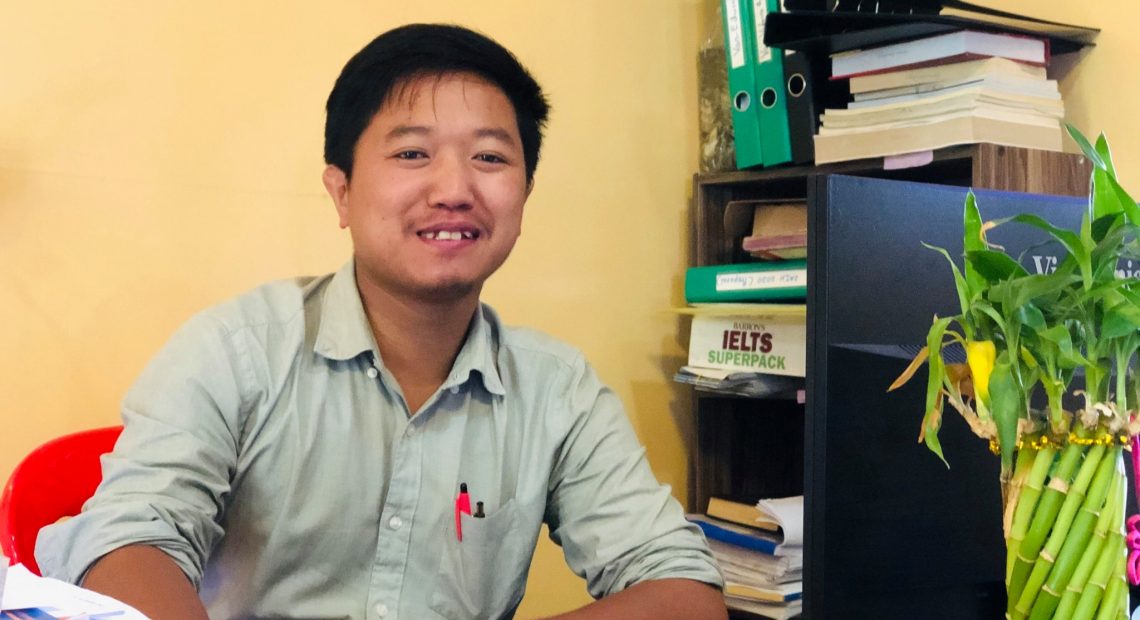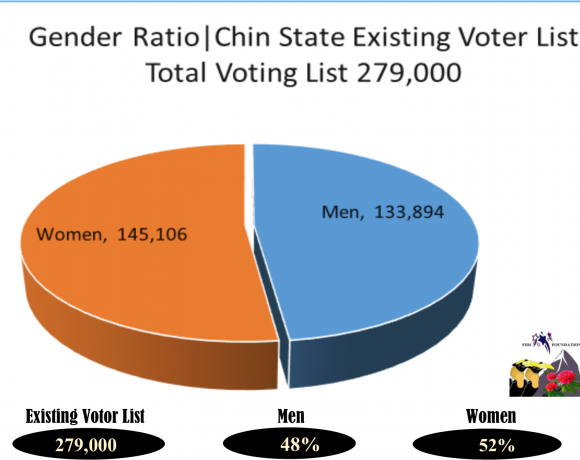Reflections on 2020 election and its results: Interview with Salai Van Cung Lian

(Photo: Salai Van Cung Lian)
21 January 2021 – Salai Van Cung Lian is a researcher based in Hakha who also manages Victoria Academy as Principal and also serves Strategic Partnership Advisor at Chinbridge Institute. He recently co-authored an article “How Many Chin Languages Should be Taught in Government Schools?.” His other publications can be found at www.chinbridgeinstitute.org. His correspondence email is [email protected].
Chinland Guardian: Do you think the 2020 election was free and fair?
Salai Van Cung Lian: It is difficult to accept that the 8 November 2020 election meets the international obligations for democratic elections. There are several reasons for this. For instance, amid a dwindled access to information in Myanmar along with unequal access to State media in the context of the election, the government of Myanmar restricted internet access, freedom of speech, and the right to freedom of assembly. And several activists were arrested or prosecuted for supposedly criticizing the government. Demonstrators were prosecuted even if the protests were organized under the COVID-19 procedures. Above all, the security threat posed by the ongoing armed conflicts served as a significant, serious and critical obstacle for the election to be free and fair as it excluded millions of citizens from voting.
Chinland Guardian: What do you think are the main reasons why NLD won a landslide victory in Chin State and Myanmar as a whole?
Salai Van Cung Lian: Let me express a few observations among many possible others. One of the key reasons why NLD took the vast majority is that they were very well prepared with good campaign strategies. They persuaded almost all key Chin influencers from different backgrounds – be businessmen, humanitarian actors as well as community influencers. Those icons, I would say, contributed a lot for the NLD to be able to claim a landslide victory.
Secondly, the NLD candidates’ profiles were pretty high ranging from retired high-ranking government officials to former university rector. Although it is very much possible that their profiles have almost nothing to do with what they are going to do after becoming MPs, it did a lot for them to persuade voters.
Thirdly, the NLD key opponent, CNLD, did very little in term of urban politics and politics of development. Recent studies demonstrated that Chin people care the most about basic infrastructures. Tops of them were access to water, electricity, road, healthcare, education and agriculture. It seems that the CNLD failed to communicate those issues adequately to the voters, and thus gave more room for NLD to claim victory.
And finally, Vice President Henry Van Thio and Aung San Suu Kyi along with tender company endowment for NLD also served as the key contributing factors.
Chinland Guardian: Actually, there has been more political motivation, especially among the youth in this election. Some were in support of CNLD while others of NLD in general. What could be the impacts of the election on the youth whether they support CNLD or NLD? Could you compare and contrast?
Salai Van Cung Lian: Youth political participation is particularly important in a fragile democracy as a disengaged youth could even be regarded as a contributing factor for several issues communities are facing. However, although it seems that youth engagement in electoral politics seems to be on the rise in Chin State, more meaningful youth participation in politics is seemingly pressured and limited by several factors. For instance, even political parties didn’t let their youth members vote in primary election. Furthermore, young people political participation is also highly restricted in constitution and laws – UEC chairperson needs to be at least 50-year-old, ages 25 and 30 are the requirements for State and Pyidaungsu Hluttaw.
So, I believed that youth participation in politics is limited by three key factors such as the foundation that is the 2008 constitution, the political party system/structure as well as Chin culture of representation where older peoples seemingly ought to represent younger peoples. The possible election impact on young people was pretty difficult to identify. However, this year election indicates that there is a possibility of increased youth political engagement in the years ahead.
Chinland Guardian: Do you think internal migrant workers’ ballots impacted the results of the election in Chin State? Internal migrant workers who have already stayed in Chin State for 90 days were allowed to vote. Do you think the UEC/Chin State Election Commission should extend the days of validity for internal migrant workers?
Salai Van Cung Lian: If the 90-day requirement gives enough time for UEC to prepare for all pre-election tasks like voter registration, and if the administrative procedure is manageable within this given 90 days, then the number of days doesn’t have to be expanded. This residency requirement is particularly important for internal migrant workers, seasonal workers and IDPs. Thus, a longer day residency requirement would negatively affect participation. It could affect the participation of some groups of citizens to the extent that they wouldn’t be able to vote at all. Although ethnic communities reportedly raised concerns in a way that indicates that the 90-day residency requirement could reduce the possibility of political dominance in their respective areas, expanding the days is not necessarily the best solution as it could fuel participation inequality in electoral politics.
Chinland Guardian: How do you think of the management of the Union Election Commission upon disallowing voting in some areas and upon taking preventive measures on COVID-19 pandemic in voting areas in Chin State?
Salai Van Cung Lian: Several armed clashes were reported in October 2020 in Chin, Kayin, Rakhine and Shan States which was further intensified in the following month. However, the country witnessed a shape declined in armed clashes in November but the conflict left hundreds of thousands of civilians in IDP camps. The point is that the armed conflict in Myanmar particularly in Chin, Kayin, Rakhine and Shan States was a critical and serious obstacle for voters. The conflict indeed allowed neither free election campaign nor freedom to vote without fear and intimidation
In term of COVID-19 preventative action on Election Day, Hakha city did pretty well. In each voting station, at least two volunteers were assigned for physical distancing controlling. But this doesn’t mean that there were no crowds. People still gathered together without maintaining physical distancing rules. And if any, the COVID-19 won’t either be controlled. For instance, it is uncomfortable to wear a pair of glove and turn very thick papers with fingers to check your name on the voter lists. So, if there were COVID-19 transmissions due to the election in Hakha, we would most probably have to blame voter list display. UEC could have provided computers for voter list checking at least on the election.
Chinland Guardian: Do you think there is gender equality in politics on the election? We learned that there are three female MPs elected in Chin State. Tell us your views on the gender issues particularly regarding the election results.
Salai Van Cung Lian: Participation inequality in term of gender differences in political participation in Chin State, I think, is tremendous. The key political parties in Chin State like CNLD, NLD and USDP failed to let more women run in the election for several reasons. The situation in 2020 was worse than in 2015. The women candidate among political parties in Chin State was decreased by 2% in 2020 with 11% in 2015 and 9% in 2020. This political participation inequality in Chin State is structural and deeply embedded in social norm. It is structural in a way that political parties keep very few numbers of women in executive ranks or even as members of executive committees at township and state levels. Additionally, one thing that surprised me the most is that MP-elect Chin women didn’t seem to have a strong commitment to promoting gender equality and equity.
Chinland Guardian: In general, what are your points of views on current politics in Chin State and Myanmar as a whole?
Salai Van Cung Lian: Myanmar development seems to have left the poorest population behind across the country. Hundreds of households with livelihood insecurity have been facing a worsening situation in previous few years – a land issue, for instance, is an issue of critical importance for many poor families which is unlikely to be solved shortly. Myanmar’s neoliberal economic policy along with ongoing armed conflicts puts the most fragile democracy under pressure.
In Chin State, the politics of development and identity are wrestling very hard. The political parties are employing both, and aided by the neoliberal economic approach to development. In Myanmar as a whole, as well as in Chin State, the government need to avoid the neoliberal trap and promote a democratic welfare state.
Chinland Guardian: What kind of new State government would you like to see?
Salai Van Cung Lian: The new Chin State Government should continue to put its efforts on its development priority areas including e-governance, social justice and basic infrastructures such as access to adequate and clean water, electrification of villages, and agriculture among many others. State Government indeed shared a relatively high level of power with the Union Government. This has allowed more opportunities for State Government to escalate its efforts for democratic transition and development.
Chinland Guardian: What kind of MPs would you like to see in the next five years?
Salai Van Cung Lian: I would love to see “engaged MPs”. In our research study, we learned that many of Chin MPs have done poorly in term of civilian-elected politician engagement and they didn’t intend to be critical of what the government has done, is doing and is planning to do. An engaged MP, I would say, is an MP who does his or her best to hold the government accountable and engages regularly and constantly with the constituents he or she represents.
Chinland Guardian: What are your views on the election results with NLD winning the majority of seats? What could be possible impacts – both negative and positive?
Salai Van Cung Lian: The NLD government has once failed to protect and promote civil liberties, including freedom of expression. There is little hope that the NLD government would take a significant step forward to change its direction in term of civil liberties. So, taking the vast majority seats could possibly mean it is less chance to take the NLD into account when deems necessary. If that is the case, then it is even sensible to say that the multi-party parliamentary system in Myanmar is going to be under pressure.
Chinland Guardian: Looking at the past five years of NLD-led government, what can you share with us both for the past years and for the next five years, including foreign policy for the whole country?
Salai Van Cung Lian: As indicated early, freedom of information along with other civil liberties were sharply declined within the NLD-led government in the last few years. In addition to NLD failure to pass Freedom of Information Act, it also failed to amend what some analysts might have called “problematic laws” that include Broadcasting Law, Electronic Transactions Law, News Media Law, Official Secrets Act, Printing and Publishing Law, Peaceful Assembly Law and Penal Code. These laws must be amended in a way that would give more room for civil liberties.#
This interview was conducted in December 2020 by Cer Len Ci and Naomy VT Chin.




